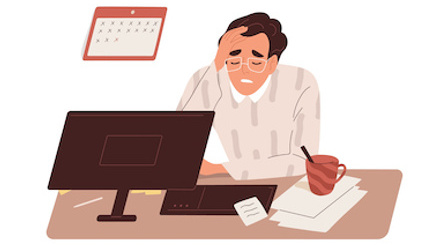The long-term outlook for employees' mental health and three key ways to support it

More businesses are starting to take the initiative to introduce means to tackle this subject within the workplace with a long-term outlook. There are many different avenues which businesses can use to approach this, some very costly and others about working smartly and offering more flexibility.
As well as the pressure on employees’ mental health – feeling stretched, burnt out and out of resources – there is also the Covid-19 pandemic which will have consequences for years to come. As the current unprecedented times continue, despite things starting to open, business leaders should continue to put their employees' mental health and wellbeing at the forefront of their agendas.
The so-called new normal has umpteen different meanings and thus, different ways it will play out for each organisation and their individual employees, both now and in the future. It's critical to remember that coronavirus has shaken everyone, nobody has been unaffected, so the big question is: how can organisations support their employees' mental health now and in the long run?
Supporting mental health today and in the long run
A work-life balance is absolutely crucial for all employees and their wellbeing. It is very easy to blur the lines between personal and work time, which can ultimately strain your teams’ mental health. Encourage your team to work an eight-hour day (even with some flexibility if needs be) and not more, to try not check emails late at night or over the weekend, or limit the overtime hours, if tasks permit.
Ensuring your team feel they are able to have this balance will do wonders for their mental wellbeing. When your team are overworked and overstretched, they are not working to their optimum so it’s a lose-lose situation all round. Let your team do suitable hours, attend appointments and take the necessary time they need. Sometimes this speaks louder than words and can assist in reducing unnecessary stress, increasing productivity and reducing staff sickness.
More so than before, it is critical to focus on your employees’ wellbeing and give them the necessary tools they need to feel better equipped to deal with their mental wellbeing, fears and insecurities, and to best support them in whatever way possible. With social distancing and many people working from home, access to mental health support may look different to the traditional ways of helping. Below are three key ways to support your teams’ mental health and wellbeing both in the present and beyond:
1. Offer an EAP
Companies can show a duty of care to their employees by offering an employee assistance programme (EAP). This will give employees access to 24/7 confidential help and advice when they most need it. If employees are experiencing any work-related or personal difficulties during this challenging time, this can severely affect their working capacity and can increase absenteeism. Employee morale will be down and this can impact the whole culture, especially while the workforce is dispersed and less motivated as it is. An EAP service can include everything from telephone helplines, structured telephone counselling, post trauma support, GP call back and medical advice, through to commercial legal advice for HR, online Health Portal, online Health Assessments, online Personal Coaching Tools…to name a few.
2. Recognition, praise and thanks!
All of us (employers and employees alike) need recognition. Recognition that a job has been done well, or a simple thank you – is a basic human need. And this is even more true when working from home, or a team is not coherently working together and are dispersed during the pandemic. When receiving a well done or public acknowledgment in front of the team, be it live or virtually, there is nothing better to boost morale and make one feel valued, ultimately impacting one’s mental wellbeing. The ramifications of this are huge, where commitment, motivation and passion can soar.
Whether you decide to recognise and reward informally, or by implementing a full-scale reward and recognition programme, this is an area where time, resources and efforts should be allocated. This has a significant impact on mental health and wellbeing, both in the workplace and out.
3. Wellbeing and wellness initiatives
A longer term solution to tackling mental health can be to introduce ongoing healthy benefits and perks for employees. There are many ways to do this, be it giving the team some time out to focus on themselves, regular Yoga classes, a meditation room, or some boot camp classes at the local park. Why not introduce a healthy snack station or a smoothie bar in the office? More so, encourage your teams to take time away from their screens, have a walk around, stretch their legs and get away from the grind.
More and more businesses are starting to implement an Employee Benefits Platform which is packed with health, wellbeing, gym, healthy eating etc offers and discounts all under one roof. A healthy body can aid a healthy mind, so lead the way to a healthier workplace which can most definitely tackle mental health and alleviate any additional stressors.
This article is provided by Xexec.
In partnership with Xexec
Xexec is the UK's leading Reward and Recognition and Employee Benefits provider.







